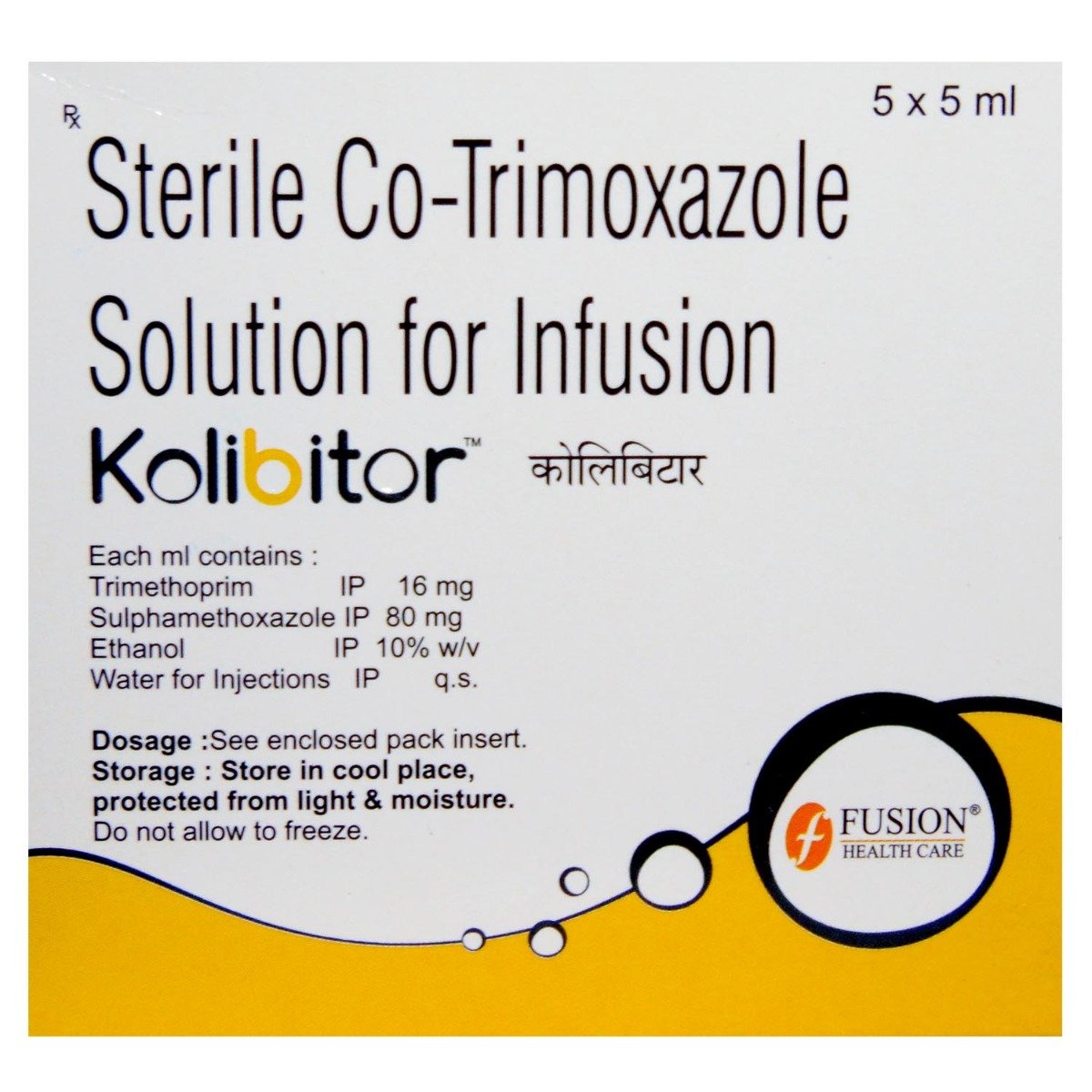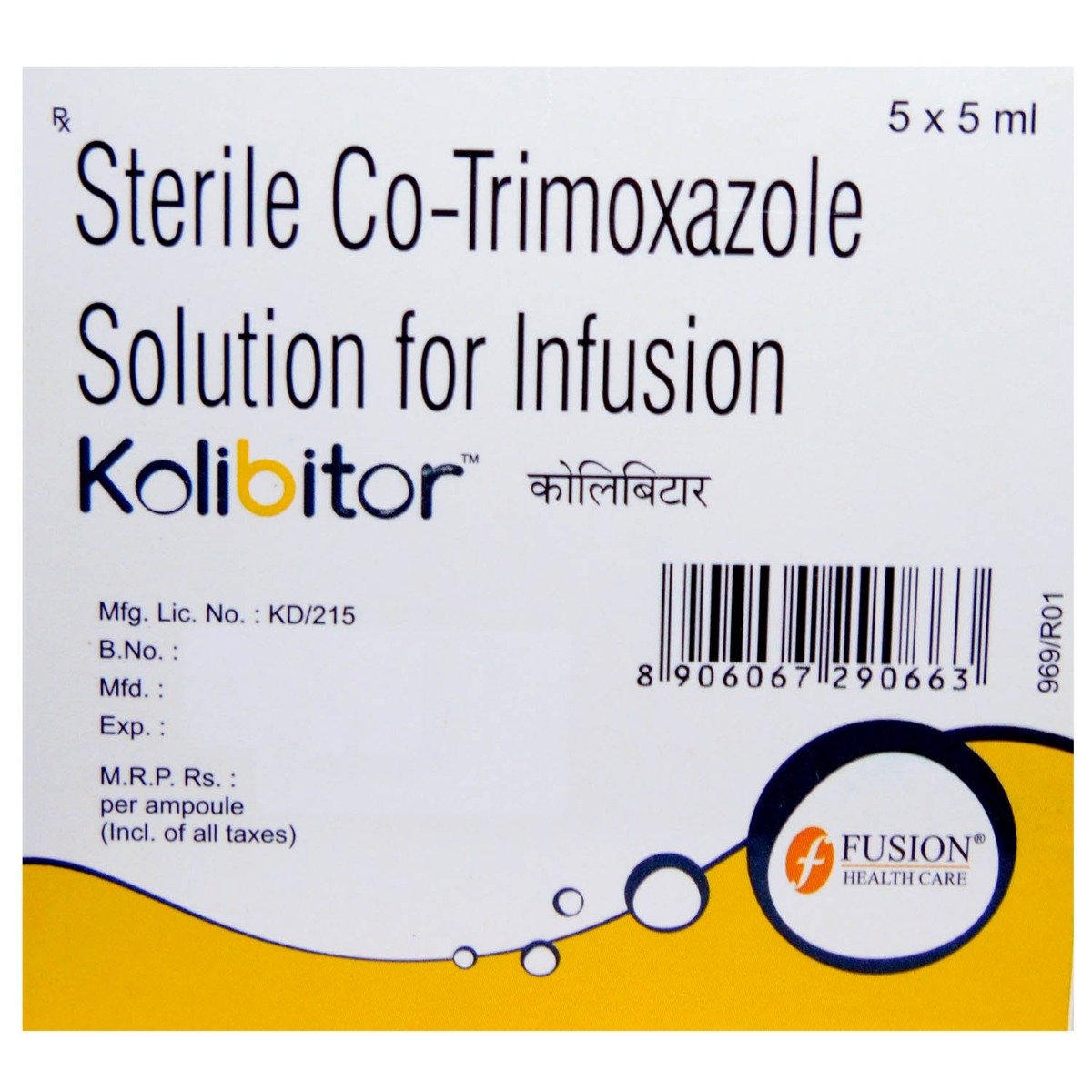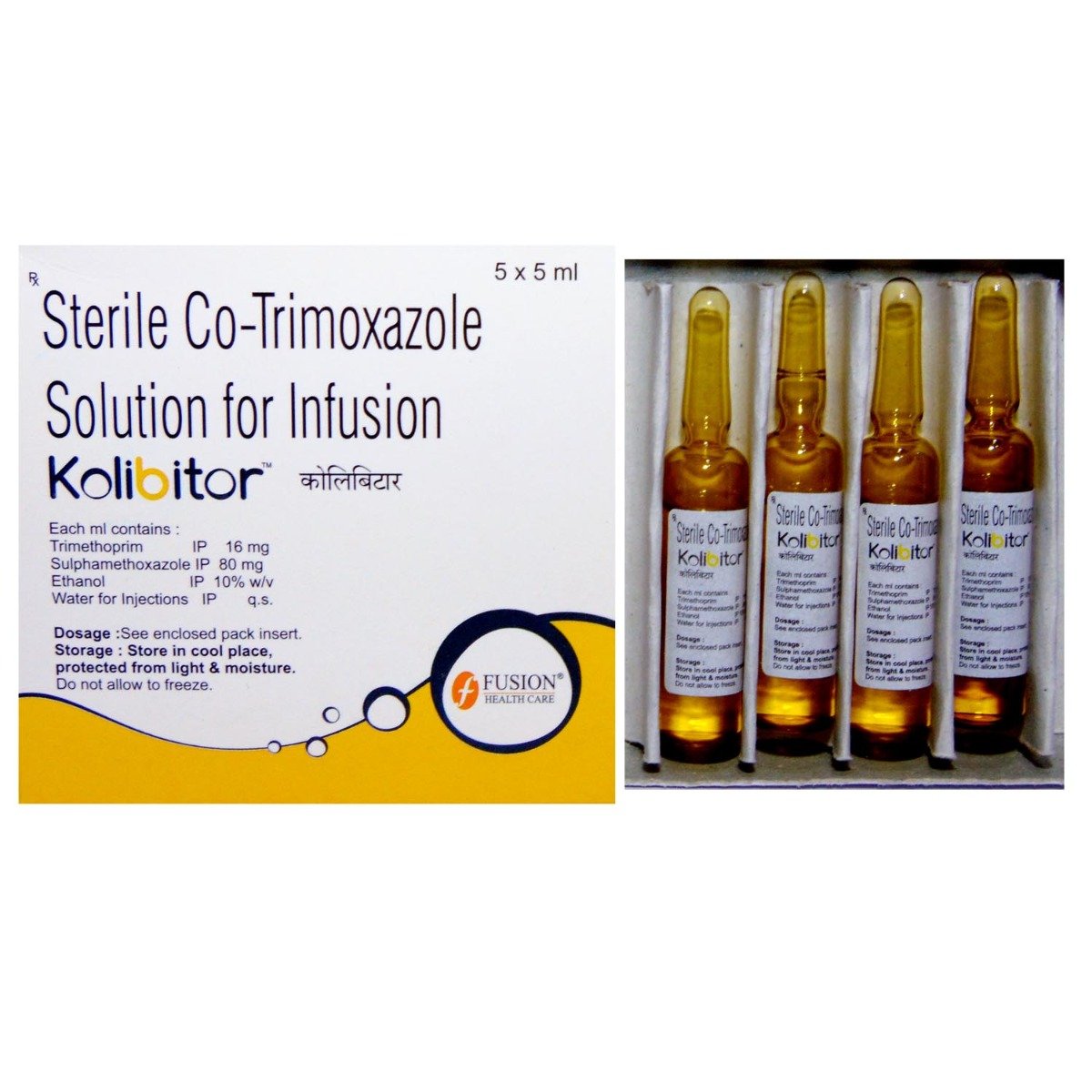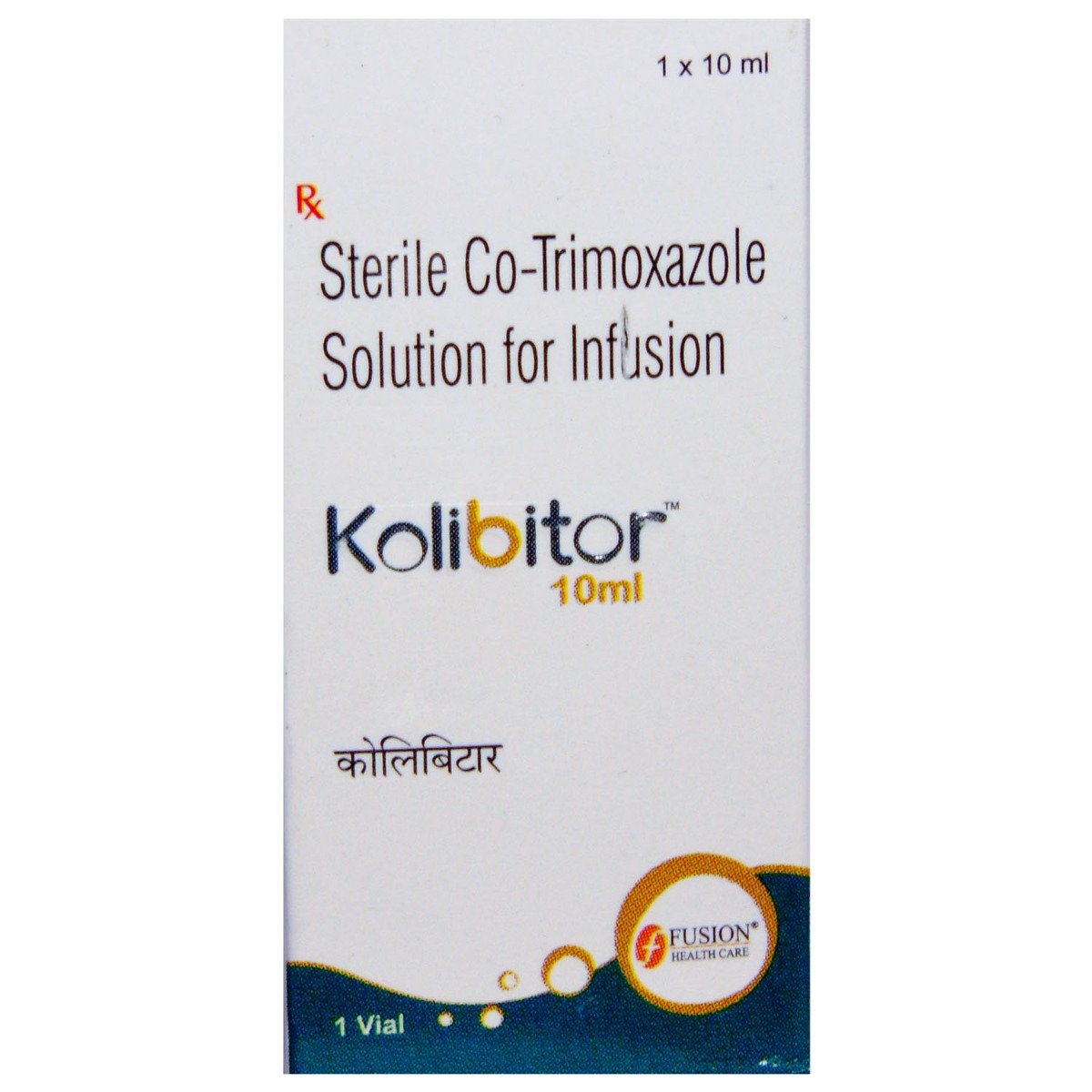Kolibitor Injection 5 ml
MRP ₹365.5
(Inclusive of all Taxes)
₹54.8 Cashback (15%)
Provide Delivery Location
Online payment accepted
 Prescription drug
Prescription drugWhats That
Composition :
Manufacturer/Marketer :
Consume Type :
Expires on or after :
Return Policy :
About Kolibitor Injection 5 ml
Kolibitor Injection 5 ml belongs to the class of medicines called antibiotics. It is used to treat or prevent lung infections caused by bacteria called Pneumocystis jirovecii and Toxoplasma. Also, it is used to treat urinary bladder or urinary tract infections (water infections), ear infections such as otitis media, respiratory tract infections such as bronchitis, and nocardiosis, which can affect the skin, lungs and brain. A bacterial infection is a condition in which harmful bacteria grow in the body and cause infection. It can infect any part of the body and multiply very quickly. Kolibitor Injection 5 ml does not work against infections, flu or cold symptoms caused by the virus.
Kolibitor Injection 5 ml contains two antibiotics, Sulfamethoxazole (sulfonamide) and Trimethoprim (antifolate). These antibiotics work together to prevent bacteria from producing folic acid, which is necessary for DNA production. Thus, it inhibits the growth and multiplication of bacteria and stops the spread of infection.
Kolibitor Injection 5 ml will be administered by a healthcare professional; do not self-administer. Sometimes, you may experience abnormal heartbeats, headache, diarrhoea, skin rashes, nausea, thrush or candidiasis (a fungal infection that affects the mouth or vagina) as side effects. Most of these side effects do not require medical attention and gradually resolve over time. However, if the side effects persist or worsen, please consult your doctor.
Avoid receiving Kolibitor Injection 5 ml if you are allergic to Sulfamethoxazole, trimethoprim, co-trimoxazole, or any other ingredients of Kolibitor Injection 5 ml, or sulfonamide medicines or if you have thrombocytopenia (low blood platelets), porphyria (a rare blood problem), severe liver or kidney problems. $nmae is not recommended for infants aged six weeks. If you are pregnant or planning for pregnancy, inform your doctor before receiving Kolibitor Injection 5 ml. You are recommended to avoid breastfeeding while on treatment with Kolibitor Injection 5 ml. If you have reddish target-like spots or circular patches, often with central blisters on the trunk, please consult a doctor immediately, as these might be signs of Stevens-Johnson syndrome.
Uses of Kolibitor Injection 5 ml
Directions for Use
Key Benefits
Kolibitor Injection 5 ml is a combination of two antibiotics, Sulfamethoxazole and Trimethoprim. It is used to treat or prevent lung infections caused by a bacteria called Pneumocystis jirovecii and infections caused by a bacteria called Toxoplasma. Also, it is used to treat urinary bladder or urinary tract infections (water infections), respiratory tract infections such as bronchitis, ear infections such as otitis media, and nocardiosis which can affect the skin, lungs and brain. Additionally, Kolibitor Injection 5 ml is used to treat brucellosis (a bacterial infection that spreads from animals to people) if other treatments are not effective and in combination with other agents in line with national treatment guidelines. These antibiotics work together to prevent bacteria from producing folic acid, which is necessary for DNA production. Thereby inhibiting the growth and multiplication of bacteria and stopping the spread of infection.
Storage
Drug Warnings
Avoid receiving Kolibitor Injection 5 ml if you are allergic to Sulfamethoxazole, trimethoprim, co-trimoxazole, or any other ingredients of Kolibitor Injection 5 ml, or sulfonamide medicines or if you have thrombocytopenia (low blood platelets), porphyria (a rare blood problem), severe liver or kidney problems. $nmae is not recommended for infants aged six weeks. If you are pregnant or planning for pregnancy, inform your doctor before receiving Kolibitor Injection 5 ml. You are recommended to avoid breastfeeding while on treatment with Kolibitor Injection 5 ml. If you have reddish target-like spots or circular patches, often with central blisters on the trunk, please consult a doctor immediately, as these might be signs of Stevens-Johnson syndrome. If you are elderly, malnourished or underweight, inform your doctor before receiving Kolibitor Injection 5 ml.
Drug-Drug Interactions
Drug-Drug Interactions
Login/Sign Up
Taking Kolibitor Injection 5 ml with BCG vaccine can reduce the effectiveness of the BCG vaccine
How to manage the interaction:
Although there is an interaction between Kolibitor Injection 5 ml and BCG vaccine is not recommended, they can be taken together if prescribed by a doctor. Do not discontinue any medications without consulting a doctor.
The combined use of Kolibitor Injection 5 ml and clozapine may increase the risk or severity of toxicity.
How to manage the interaction:
There may be a possibility of interaction between Clozapine and Kolibitor Injection 5 ml, but it can be taken if prescribed by a doctor. If you're having any of these symptoms like fever, chills, sore throat, or muscle aches, it's important to contact your doctor right away. They may be able to recommend other options for you that won't cause any problems. Don't worry, there are solutions available to help you feel better. Do not discontinue any medications without first consulting your doctor.
Taking Kolibitor Injection 5 ml with Levobupivacaine may cause methemoglobinemia (blood disorder in which too little oxygen is delivered to your cells).
How to manage the interaction:
Although there is a possible interaction between Levobupivacaine and Kolibitor Injection 5 ml, you can take these medicines together if prescribed by your doctor. However, if you experience nausea, headache, dizziness, fatigue, or difficulty breathing, it's best to contact your doctor right away. Do not stop using any medications without talking to your doctor.
Taking Kolibitor Injection 5 ml with telmisartan may increase potassium levels in the blood.
How to manage the interaction:
Although there is an interaction between telmisartan and Kolibitor Injection 5 ml, they can be taken together if prescribed by a doctor. However, consult a doctor if you experience nausea, vomiting, weakness, confusion, tingling of the hands and feet, feelings of heaviness in the legs, and a weak pulse. Do not discontinue the medications without consulting a doctor.
Taking Irbesartan with Kolibitor Injection 5 ml may increase potassium levels in the blood and kidney problems.
How to manage the interaction:
Although taking Irbesartan with Kolibitor Injection 5 ml together can possibly result in an interaction, it can be taken if a doctor has prescribed it. However, consult your doctor if you experience nausea, vomiting, weakness, disorientation, tingling in your hands and feet, feelings of heaviness in your legs, or a slow or irregular heartbeat. Do not discontinue any medications without a doctor's advice.
Taking olmesartan medoxomil with Kolibitor Injection 5 ml may increase potassium levels in the blood.
How to manage the interaction:
Although taking olmesartan medoxomil with Kolibitor Injection 5 ml may lead to an interaction but can be taken if prescribed by the doctor. However, consult the doctor if you experience nausea, vomiting, weakness, disorientation, tingling in your hands and feet, feelings of heaviness in your legs, a weak pulse, or a slow or irregular heartbeat. Do not stop using any medications without talking to a doctor.
Kolibitor Injection 5 ml may decrease the blood levels and effects of folic acid.
How to manage the interaction:
Although there is a possible interaction between Folic acid and Kolibitor Injection 5 ml, you can take these medicines together if prescribed by your doctor. Do not stop using any medications without consulting your doctor.
Taking captopril with Kolibitor Injection 5 ml may increase the risk of hyperkalemia (high level of potassium in the blood) and kidney problems.
How to manage the interaction:
Although there is a interaction between Kolibitor Injection 5 ml and captopril, they can be taken together if prescribed by a doctor. Do not discontinue any medications without consulting a doctor.
When amiloride is taken with Kolibitor Injection 5 ml it may raise potassium levels in the blood. (High potassium levels can cause hyperkalemia, which can lead to kidney failure, muscular paralysis, abnormal heart rhythm).
How to manage the interaction:
Although there is an interaction between amiloride and Kolibitor Injection 5 ml, they can be taken together if prescribed by a doctor. However, consult a doctor if you experience nausea, vomiting, weakness, tingling in your hands and feet, feelings of heaviness in your legs, a weak pulse. Do not discontinue any medications without consulting a doctor.
Enalapril combined with Kolibitor Injection 5 ml can cause hyperkalemia by elevating blood potassium levels. In severe cases, hyperkalemia can induce muscle paralysis, renal damage, and cardiac problems. The risk is increased if you are elderly, dehydrated, or have a history of renal or cardiovascular disease.
How to manage the interaction:
Although taking Enalapril together with Kolibitor Injection 5 ml may possibly result in an interaction, they can be taken together if prescribed by your doctor. However, contact your doctor immediately if you experience signs and symptoms of hyperkalemia, such as nausea, vomiting, confusion, numbness, tingling in hands and feet, and irregular heartbeat. It is advised to limit the intake of potassium-rich foods like tomatoes, bananas, mangoes, beans, and potassium-containing supplements. Do not discontinue any medication without consulting your doctor.
Drug-Food Interactions
Drug-Food Interactions
Login/Sign Up
Diet & Lifestyle Advise
- Take probiotics after completing the full course of Kolibitor Injection 5 ml to restore some healthy bacteria in the intestines that may have been killed. Taking probiotics after antibiotic treatment can reduce the risk of antibiotic-associated diarrhoea. Certain fermented foods like cheese, yoghurt, kombucha, sauerkraut, and kimchi can restore the good bacteria of the intestine.
- Include fibre-rich foods, as they can be easily digested by your gut bacteria, which helps stimulate their growth. Thus, fibre-rich foods may help restore healthy gut bacteria after a course of antibiotics. Whole grains such as brown rice and whole-grain bread should be included in your diet.
- Make sure you drink plenty of water or other fluids daily while taking Kolibitor Injection 5 ml.
- Avoid alcohol consumption as it may increase adverse effects.
Side Effects of Kolibitor Injection 5 ml
- Abnormal heartbeats
- Headache
- Diarrhoea
- Skin rashes
- Nausea
- Thrush or candidiasis (a fungal infection that affects the mouth or vagina)
Habit Forming
Therapeutic Class
All Substitutes & Brand Comparisons
RX
Kolibitor Injection 10 ml
Fusion Health Care Pvt Ltd
₹561.5
(₹50.54/ 1ml)
23% CHEAPER
Author Details
We provide you with authentic, trustworthy and relevant information
Drug-Diseases Interactions
Drug-Diseases Interactions
Login/Sign Up
FAQs
Drug-Drug Interactions Checker List
- AMANTADINE
- CICLOSPORIN
- AZATHIOPRINE
- METHOTREXATE
- PYRIMETHAMINE
- SPIRONOLACTONE
- WARFARIN
- PHENYTOIN
- GLIBENCLAMIDE
- TOLBUTAMIDE
- GLIPIZIDE
- REPAGLINIDE
- DIGOXIN
- PROCAINAMIDE
- LAMIVUDINE
- ZIDOVUDINE
- PREDNISOLONE
- RIFAMPICIN
- FOLINIC ACID
Disease/Condition Glossary
Bacterial infection: It is a condition in which harmful bacteria grow in the body and causes infection. It can target any part of the body and multiply very quickly. Bacteria come in three basic shapes: spherical, rod, or spiral-shaped. Bacteria may be gram-positive (have thick cell walls) or gram-negative (do not have cell walls). Appropriate tests are done to identify bacterial strains, and based on the results, proper medication is prescribed. Some common symptoms of bacterial infection include cough, fever, and tiredness.

Have a query?
Alcohol
Safe if prescribed
The interaction of Kolibitor Injection 5 ml with alcohol is unknown. If you have any concerns, please discuss them with your doctor.
Pregnancy
Consult your doctor
Kolibitor Injection 5 ml may harm the foetus. Therefore, if you are pregnant or planning pregnancy, inform your doctor before receiving Kolibitor Injection 5 ml. Your doctor may prescribe this medicine if the benefits outweigh the risks.
Breast Feeding
Consult your doctor
Avoid breastfeeding while on treatment with Kolibitor Injection 5 ml due to its potential risk of bilirubin displacement and kernicterus (brain damage). If you are a breastfeeding mother, please inform your doctor before receiving Kolibitor Injection 5 ml.
Driving
Safe if prescribed
Limited information is available on the effect of Kolibitor Injection 5 ml on driving. Please discuss with your doctor before driving or operating machinery after receiving Kolibitor Injection 5 ml.
Liver
Consult your doctor
If you have a pre-existing or a history of liver disease, inform your doctor before receiving Kolibitor Injection 5 ml. Your doctor may adjust the dose of this medicine or prescribe a suitable alternative based on your condition. Kolibitor Injection 5 ml is contraindicated in patients with severe liver disease.
Kidney
Consult your doctor
If you have a pre-existing or a history of kidney diseases, inform your doctor before receiving Kolibitor Injection 5 ml. Your doctor may adjust the dose of this medicine or prescribe a suitable alternative based on your condition. Kolibitor Injection 5 ml is contraindicated in patients with severe kidney disease.
Children
Safe if prescribed
Kolibitor Injection 5 ml is contraindicated in children less than two months of age (less than six weeks) due to the risk of bilirubin displacement and kernicterus (brain damage).












